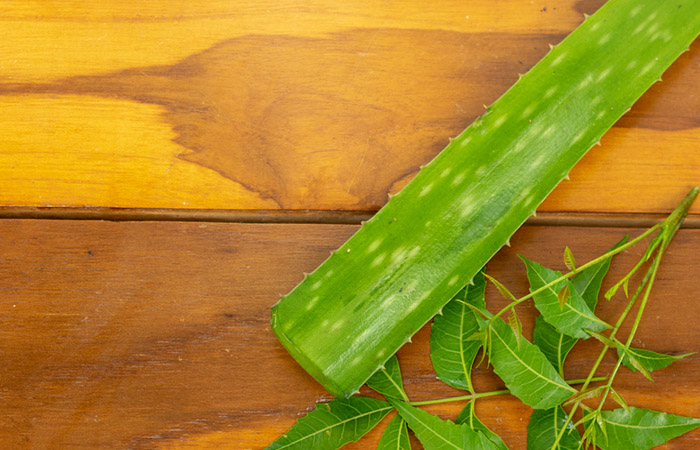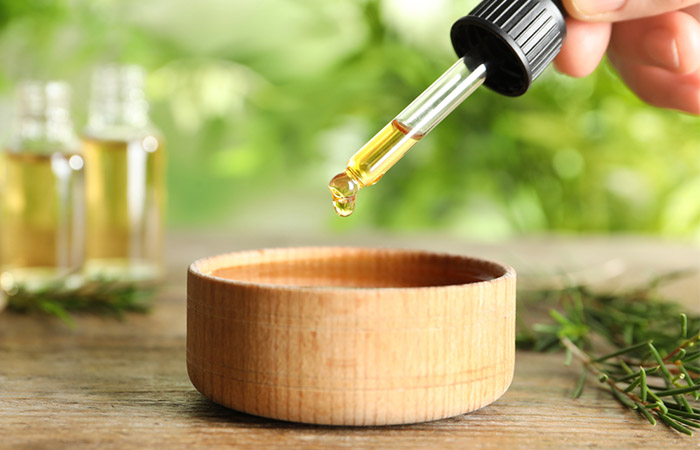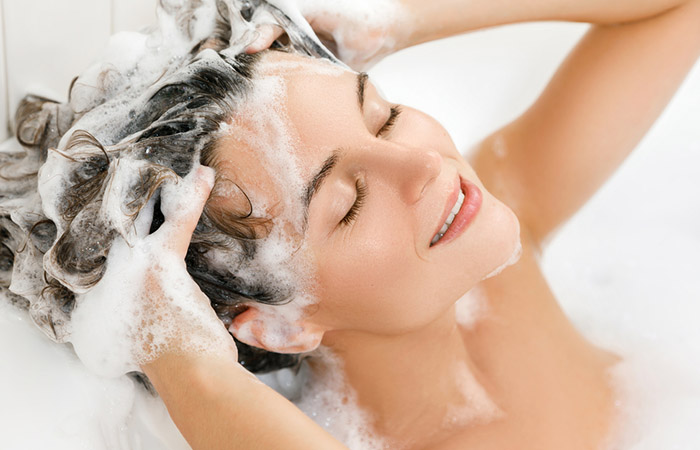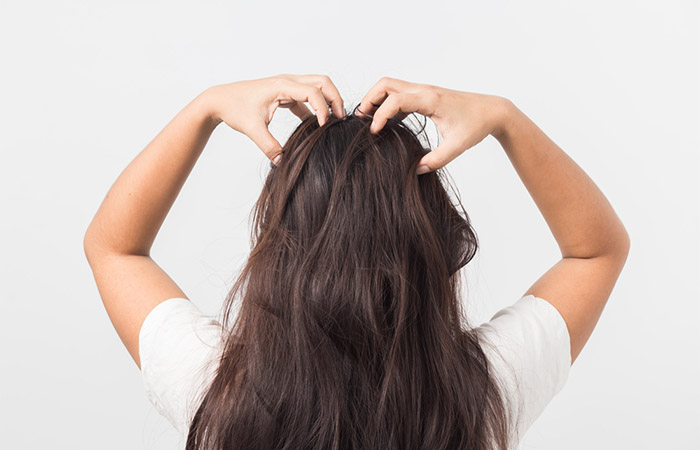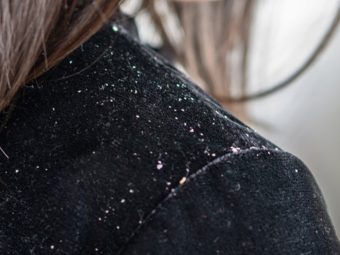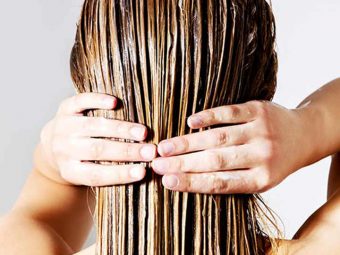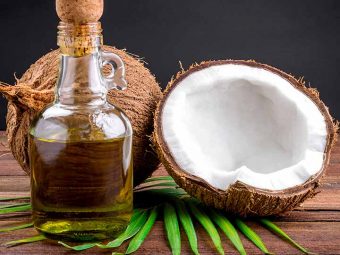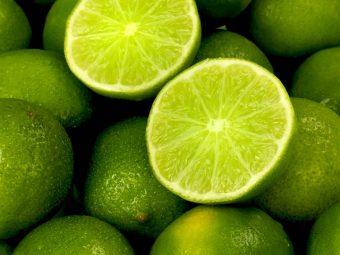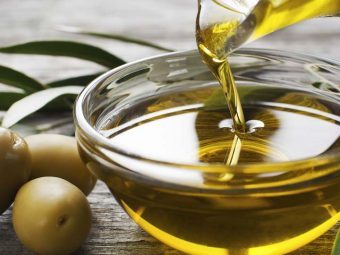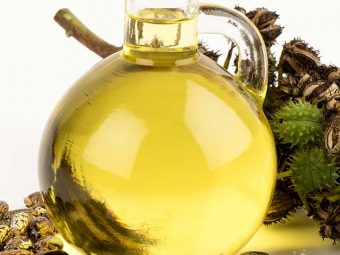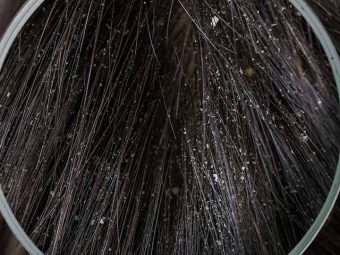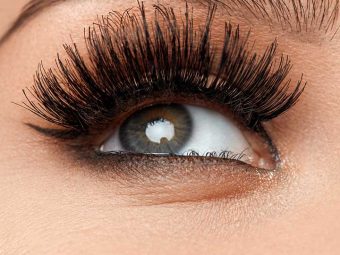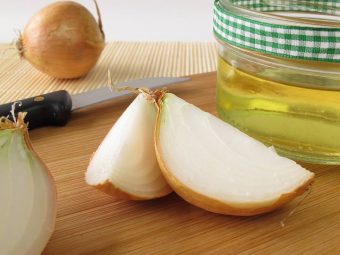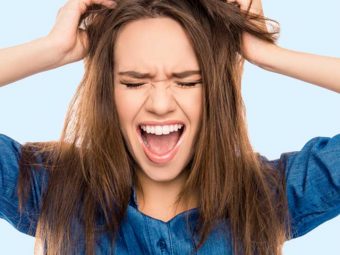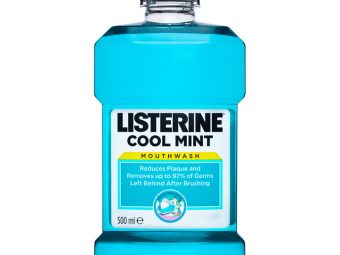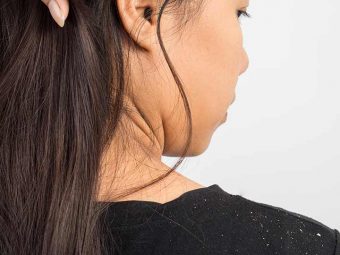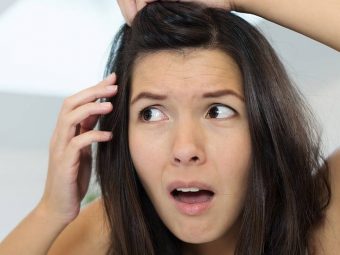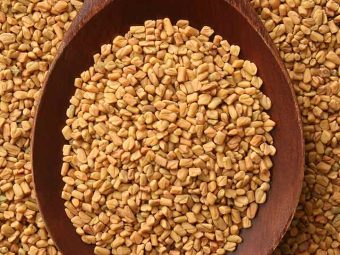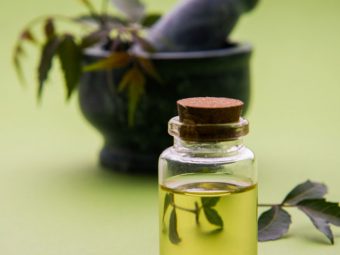How To Get Rid Of Dandruff In Winter Naturally
Enjoy flake and itch-free scalp in the cold weather with these DIY and natural remedies.
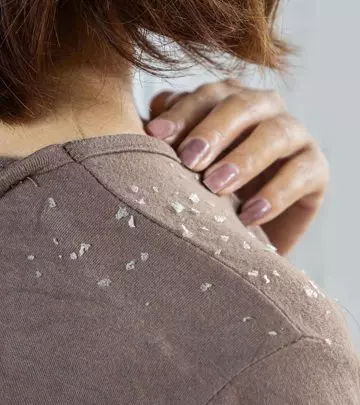
Image: Shutterstock
The winter might bring snow, but it also brings flakes to our scalp! Research shows that dandruff tends to worsen during winter. But, here are the best DIY hair masks and treatments to help you get rid of dandruff in winter. These masks contain natural ingredients that relieve and protect the scalp and strengthen and moisturize your hair. Scroll down to check out how to say goodbye to dandruff this cold season!
 Quick Tip
Quick TipIn This Article
What Are The Causes Of Dandruff In Winter?
Dandruff can worsen in winter due to certain environmental and lifestyle factors, such as:
1. Dry Air: Cold outdoor air and heated indoor environments strip moisture from the scalp, causing dryness and flaking.
2. Hot Showers: Hot showers in winter can dehydrate the scalp and make it prone to dandruff.
3. Dehydration: Inadequate water intake leads to overall skin and scalp dryness, which increases the chances of dandruff.
4. Less Sun Exposure: Reduced exposure to sunlight can create a Vitamin D deficiency, which affects skin and scalp health.
5. Exposure To Fungus: Malassezia, a yeast-like fungus on the scalp, can proliferate in dry conditions, causing dandruff.
We learnt some of the common causes of dandruff in winter. Let’s find out easy DIY hair masks for winter in the next section.
5 Easy DIY Hair Masks For Dandruff In Winter
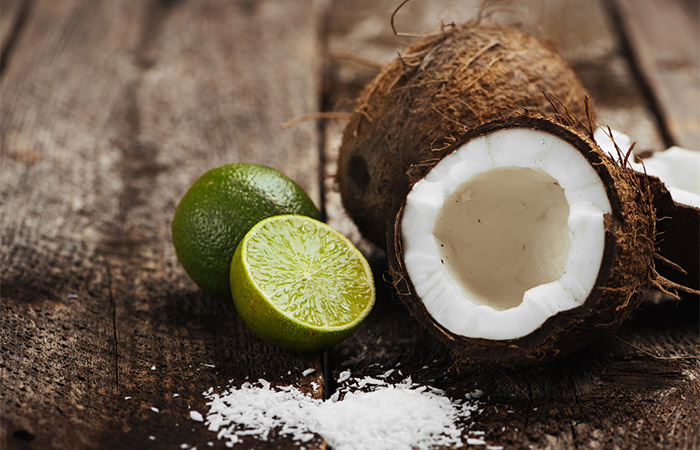
1. Coconut Oil And Lime Juice
The moisturizing properties of coconut oil and the acidic pHi XA scale used to measure the level of acidity or basicity by measuring the concentration of hydrogen ions in a substance. of lime juice are perfect for winter dandruff. Lime juice cleanses the scalp and contains citric acid that adjusts the pH of the scalp (1). This prevents the dandruff fungus from growing and thriving. Coconut oil hydrates the scalp and hair strands and keeps the hair healthy and shiny.
You Will Need
- Coconut oil
- 1 teaspoon of lime juice
- 6 teaspoons of water
- Cotton ball
Directions
- Massage coconut oil onto your scalp in circular motions.
- Dilute the lime juice and water.
- Use the cotton ball to dab this mixture on the scalp.
- Leave it on for 20 minutes.
- Wash with an anti-dandruff shampoo.
Note: Lime juice can cause irritation if not diluted. If it itches even after diluting, wash it off immediately and apply another coat of coconut oil.
2. Aloe Vera And Neem
Aloe vera decreases itching, scaling, and the areas affected by dandruff, while neem has antibacterial and antifungal properties (2), (3). When used in combination, they make for an excellent DIY mask to get rid of dandruff in winter.
You Will Need
- 2 tablespoons of aloe vera gel
- 10-15 fresh neem leaves
Directions
- Blend the aloe vera gel and neem leaves.
- Blitz for 6-7 seconds.
- Apply this mixture to the scalp and leave it on for 30 minutes.
- Wash with an anti-dandruff shampoo.
3. Apple Cider And Fenugreek
Apple cider vinegar has a low pH (acidic pH), which prevents growth of the fungus. It also helps cleanse the scalp. The high protein content and nicotinic acid in fenugreek seeds help strengthen the hair roots and prevent dandruff (4).
You Will Need
- 2 tablespoons of fenugreek seeds
- ½ teaspoon of apple cider vinegar
Directions
- Soak the fenugreek seeds overnight.
- Blend the apple cider vinegar and 10-12 tablespoons of the fenugreek seed water.
- Apply this mixture to the scalp.
- Leave it on for 30 minutes before washing.
4. Tea Tree Oil And Almond Oil
The antifungal properties of tea tree oil and nourishing properties of almond oil makes this concoction perfect for removing dandruff and treating dry and itchy scalp (5), (6).
You Will Need
- 2 drops of tea tree oil
- 50 ml of almond oil
Directions
- Dilute the tea tree oil in almond oil.
- Shake this mixture well and massage it onto your scalp.
- Leave it on for 30 minutes before washing.
Note: Tea tree oil must be diluted before using, as it can irritate the skin. If you have a sensitive scalp, avoid using tea tree oil.
5. Green Tea And Orange Juice
Green tea treats dandruff by reducing excess sebumi XAn oily secretion in the sebaceous glands that acts as a protective coating on the skin, it is also responsible for moisturizing it. production in the scalp (7). The acidic pH and vitamin C content of orange juice makes it a good combination to get rid of winter dandruff.
You Will Need
- 4 tablespoons of green tea
- 2 tablespoons of orange juice
Directions
- Mix the green tea and orange juice.
- Apply this mixture to the scalp.
- Leave it on for 20 minutes and wash with an anti-dandruff shampoo.
Nicoletta, a YouTuber, shares that DIY hair masks can treat different hair issues like dandruff, hair growth, dry damaged hair, and oily hair. She says, “I’ve been doing DIY hair masks for a very long time and I have noticed such a big difference in my hair health so I definitely recommend trying these hair masks out (i).”
These are the home remedies to get rid of dandruff in winter. There are other tricks that can help eliminate winter dandruff quickly. Here’s what you can do.
Other Effective Ways To Get Rid Of Winter Dandruff
- Use An Anti-Dandruff Shampoo
Anti-dandruff shampoos contain selenium sulfide, coal tar, zinc pyrithione, or ketoconazole (8). These ingredients help remove dandruff, treat seborrheic dermatitis and prevent fungal growth on the scalp. Use an anti-dandruff shampoo twice a week for at least four weeks for visible results. However, do not overuse these shampoos as this can prompt dandruff regrowth.
- Avoid Scratching
Dry scalp with dandruff is really itchy, and scratching your scalp will only make it worse. The flakes fall on your shoulders and make your hair dirty. Press your index finger on the scalp to control the urge to itch.
- Avoid Using Hot Water
Winters can prompt you to use hot water to wash your hair. But using hot/warm water will make your hair frizzy and dry out the scalp. This becomes an ideal environment for dandruff growth. Hence, use lukewarm water for your shower.
- Massage Oil Before Shampooing
Massage coconut or almond oils every time you shampoo your hair as they do the job of moisturizers for your scalp. This helps hydrate the strands and nourish the hair roots. It improves blood circulation to the scalp, fights dandruff and prevents hair loss.
- Avoid Styling Products With Alcohol
Any hairstyling product, such as hairspray, dry shampoo, or mousse, may contain alcohol, which dries out the scalp and makes dandruff worse. Thus, avoid hairstyling products with alcohol.
- Clean Your Hair Brush
Clean your hair brush twice a week. You do not want to transfer dandruff from the hair brush to your clean scalp. That’s why it is essential to clean your hair brush every time you shampoo.
- Do Not Tie Wet Hair
Tying wet hair creates a humid environment for dandruff growth. Use a blow dryer on the warm setting to dry your hair during winters. You can also wear a scarf, muffler, or hoodie to keep your hair protected from the cold weather.
- De-stress Your Mind
Stress increases the cortisoli XAvoid unhealthy fats, sugary, and fried foods that can affect your skin care routine by leading to more sebum generation, making dandruff worse. level of your body, which affects scalp health. Set aside time to de-stress yourself. You may workout, take a walk, run, read, write, listen to music, or meditate.
- Maintain A Healthy Diet
You must also boost your scalp health from the inside. Consume foods that help reduce inflammation, such as omega-3-rich fish (mackerel, salmon, tuna, etc.), nuts, and seeds. Include protein-rich foods like legumes, eggs, mushrooms, and soy in your diet. Consume green leafy veggies and fruits for vitamins, minerals, and fiber.
 Quick Tip
Quick TipIncorporate these habits to keep dandruff at bay during winters and improve the health of your hair, skin, and nails.
Dandruff is common in the winter, causing itching, irritation, and discomfort! However, you may rely on natural ingredients from your kitchen to combat dandruff in the winter and get a healthy, clean scalp. Furthermore, your pantry ingredients get the job done without burning a hole in your wallet. Isn’t that fantastic? You can get rid of winter dandruff with these DIY hair masks and the methods mentioned above. So, start your anti-dandruff hair care routine right now! This winter, a little extra care will go a long way towards preventing dandruff.
Frequently Asked Questions
How do you prevent dry scalp in the winter?
Massage your scalp with coconut or almond oils twice a week to prevent dryness. You can get a hair spa treatment once a month. Also, drink 2-3 liters of water daily.
Why does my dandruff get worse in winter?
The cold and dry weather during the winter season triggers dandruff. The best way to control it is to massage oil onto your scalp, use DIY hair masks, eat healthy, and stay stress-free.
How do the use of hats and other winter headgear impact dandruff?
Prolonged use of hats may cause the scalp to produce more sweat and oil. This may create a favorable environment for the dandruff-causing yeast to grow.
How can an individual tell if their dandruff results from the winter weather as opposed to other causes?
A lack of oil production causes a flaky scalp, allowing dandruff to develop during winter. The lack of moisture in the air during winter may also contribute to dandruff by causing scalp dryness. This can cause itching and visible, small, white flakes on your hair and clothing.
What are some long-term strategies for preventing dandruff in the winter and all year round?
You can reduce the risk of developing dandruff by washing your hair regularly, using a mild shampoo, and avoiding heat tools. Drinking plenty of water, managing stress, and identifying any underlying medical condition help maintain a healthy scalp.
Key Takeaways
- Dry air, hot showers, and limited sun exposure can aggravate dandruff in winter.
- You can incorporate DIY hair masks made of natural ingredients like coconut oil, lime juice, neem, and apple cider vinegar to hydrate the scalp and manage dandruff.
- Use a gentle anti-dandruff shampoo and consume a diet rich in omega-3 fatty acids, vitamins, and protein to help promote overall scalp health.
References
Articles on StyleCraze are backed by verified information from peer-reviewed and academic research papers, reputed organizations, research institutions, and medical associations to ensure accuracy and relevance. Read our editorial policy to learn more.
- Shampoo and Conditioners: What a Dermatologist Should Know?
https://www.ncbi.nlm.nih.gov/pmc/articles/PMC4458934/ - A double-blind, placebo-controlled trial of an Aloe vera (A. barbadensis) emulsion in the treatment of seborrheic dermatitis
https://www.tandfonline.com/doi/abs/10.3109/09546639909055904 - ANTIFUNGAL PROPERTIES OF NEEM (AZARDIRACHTA INDICA) LEAVES EXTRACT TO TREAT HAIR DANDRUFF
https://www.researchgate.net/publication/333671637_ANTIFUNGAL_PROPERTIES_OF_NEEM_AZARDIRACHTA_INDICA_LEAVES_EXTRACT_TO_TREAT_HAIR_DANDRUFF - EFFECT OF GERMINATED SEEDS OF FENUGREEK ON Malasseizia furfur FROM HAIR DANDRUFF
https://www.journalcra.com/sites/default/files/issue-pdf/611.pdf - Treatment of dandruff with 5% tea tree oil shampoo
https://pubmed.ncbi.nlm.nih.gov/12451368/ - Ethnopharmacological survey of home remedies used for treatment of hair and scalp and their methods of preparation in the West Bank-Palestine
https://www.ncbi.nlm.nih.gov/pmc/articles/PMC5499037/ - Development and clinical evaluation of green tea hair tonic for greasy scalp treatment
https://www.researchgate.net/publication/308149951_Development_and_clinical_evaluation_of_green_tea_hair_tonic_for_greasy_scalp_treatment - DANDRUFF: THE MOST COMMERCIALLY EXPLOITED SKIN DISEASE
https://www.ncbi.nlm.nih.gov/pmc/articles/PMC2887514/





